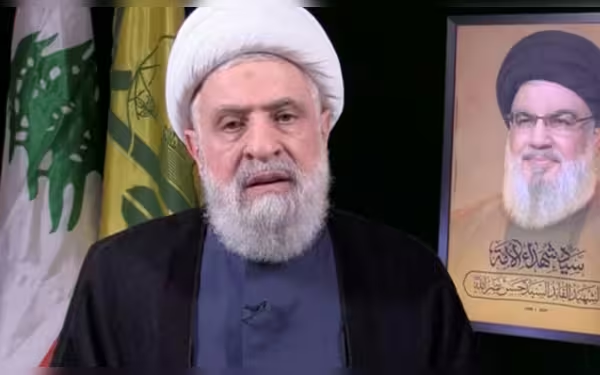Thursday, November 7, 2024 02:45 PM
Hezbollah Chief Naim Qassem Demands Israel Cease Attacks for Truce Talks
- Hezbollah insists on battlefield resolution over political negotiations.
- Indirect talks contingent on Israel halting aggression.
- Concerns over Lebanese sovereignty in proposed agreements.
 Image Credits: brecorder
Image Credits: brecorderHezbollah's Naim Qassem states truce talks depend on Israel stopping attacks, emphasizing military strength over diplomacy.
In recent developments, the ongoing conflict between Hezbollah and Israel has taken a new turn as Hezbollah's chief, Naim Qassem, has made significant statements regarding the possibility of a truce. The situation has escalated over the past year, with tensions rising not only in Lebanon but also in the broader region, particularly due to Israel's military actions in Gaza. The conflict has drawn international attention, raising concerns about stability and security in the Middle East.
During a televised address, Qassem emphasized that the resolution to the hostilities would not come from political negotiations but rather from the battlefield itself. He stated, "I will tell you very clearly, our conviction is that only one thing can stop this war of aggression, and that is the battlefield." This assertion highlights Hezbollah's belief that military strength and actions are the primary means to achieve peace, rather than diplomatic efforts.
Qassem further elaborated that any potential for indirect negotiations would only arise if Israel ceased its attacks on Lebanon. He mentioned, "When the enemy decides to stop the aggression, there is a path for negotiations that we have clearly defined – indirect negotiations through the Lebanese state and Speaker (of parliament Nabih) Berri." This indicates a willingness to engage in dialogue, but only under specific conditions that prioritize Lebanese sovereignty.
Moreover, Qassem insisted that any discussions must ensure the full protection of Lebanese sovereignty, stating that negotiations could only proceed if this condition was met. However, he did not provide further details on what these negotiations would entail. This lack of clarity raises questions about the feasibility of reaching a peaceful resolution.
On the other hand, Israel has expressed its intentions to return displaced residents from northern Israel to their homes and to eliminate any threats posed by Hezbollah. Recently, a draft proposal from the United States suggested a 60-day truce, which included provisions allowing Israel to act against imminent threats in Lebanon. However, Lebanese officials have voiced concerns that Israel's insistence on direct enforcement of any agreement could infringe upon Lebanon's sovereignty.
The situation remains complex, with both sides holding firm to their positions. As the conflict continues, the prospect of peace seems distant, and the humanitarian implications for civilians caught in the crossfire are dire. It is crucial for all parties involved to consider the broader consequences of their actions and to seek a resolution that prioritizes stability and security for the region. The path to peace may be fraught with challenges, but dialogue and mutual respect are essential for any lasting solution.













